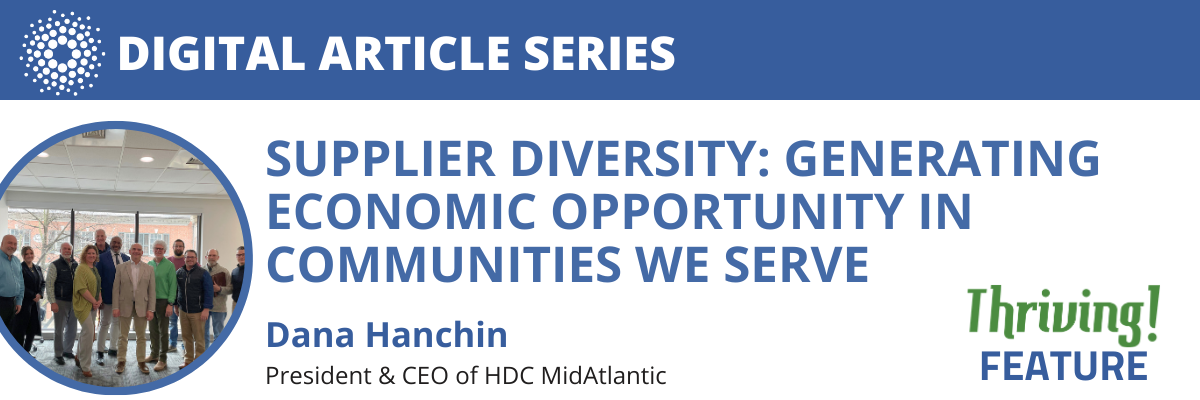By Dana Hanchin, President & CEO of HDC MidAtlantic
Working Together
HDC MidAtlantic’s (HDC) mission is to build hope and opportunity for residents to reach their full potential by creating, preserving, and strengthening affordable housing communities. We know we cannot achieve this alone. It takes many partners to meet the overwhelming need. Providing equitable housing options contributes to the sustainability and prosperity of Lancaster County.
Headquartered in Lancaster City, HDC has been a part of this community for more than 50 years. We are a trusted affordable housing developer, property manager, resident advocate, and community partner serving more than 5,000 residents in 72 communities across Pennsylvania, Delaware, and Maryland—24 of which are in Lancaster County. Over time, HDC has served more than 50,000 residents, investing $325 million to create affordable housing, resulting in more than $1 billion in economic impact.
The last few years have been challenging, moving through a global pandemic while America works toward racial justice. Through this, HDC has focused on the actions that are within our control. We are excited to share the launch of our Supplier Diversity Program. HDC works with over 550 vendors and spends approximately $26 million annually to develop and manage our affordable housing communities. As a generator of economic opportunity throughout the region, we believe we can do more to advance equity and extend opportunities to diverse-owned businesses.
Supplier Diversity
For 60 years, Supplier Diversity has been a practice incorporated into business models across industries to generate economic opportunity for historically underrepresented businesses. These programs promote equity and economic inclusion for Minority Business Enterprises (MBE) and Women Business Enterprises (WBE) that are at least 51% owned and operated by BIPOC and women respectively.
The beginnings of what is today known as Supplier Diversity can be traced to the Civil Rights movement when several landmark laws were enacted to outlaw discrimination based on race, gender, religion, and national origin. Under President Richard Nixon, the Office of Minority Business Enterprise was founded in 1969 to ensure that minority business owners had equal opportunities in the marketplace. Programs were launched to incentivize corporations contracting with diverse businesses. Supplier Diversity has been integrated into workplace culture as more businesses consider their impact.
Racial Equity, Diversity & Inclusion
HDC’s commitment to racial equity, diversity, and inclusion underpins our work as we strive to address America’s legacy of systemic racism especially discriminatory policies that limit access to affordable housing for marginalized communities. We launched our Supplier Diversity Program in 2022 to improve opportunities for local, minority, women-led, and disadvantaged businesses, and to ensure that we are contracting with companies that are aligned with our values.
Our goal is that by 2025, 25% of HDC’s discretionary spending supports MBE, WBE, and special designation businesses in construction, real estate development, property management, and corporate expenditures. These certifications can be complex processes. HDC is only requiring a self-affidavit from businesses asserting their status and will support their work toward certification.
Take Action
HDC’s Supplier Diversity Program began with establishing an internal Business Diversity Committee and sourcing external expertise from LMH Strategies, Inc. We’ve learned:
Data Matters: Understand who you are working with and where you can increase spend to minority and women-owned business. Set a baseline to measure progress against. Don’t worry if your baseline seems low. Accept where you are. With discipline and intentionality, you will make progress.
Systems Matter: Review and update your internal on-boarding process. Be sure you’re collecting all necessary information and vetting potential businesses for MBE, WBE, and special designation status. You may realize that your company doesn’t ask these questions of vendors. That’s OK—start now.
Advocacy Matters: Start talking with external stakeholders and supply chain businesses about your strategy, goals, and protocol changes. Encourage their participation and let them know you are a partner. Together, you can problem solve and build momentum.
Leadership Matters: As leaders, we can set a vision and execute, but understand that we are learners in this work. Put together the best plan you can, consult those impacted, and be prepared to make mistakes. Keep adjusting and adapting. This is a long game.
Make A Commitment
We all have a role in this work. It requires us to identify, promote, and support diverse businesses. If we continue choosing the same suppliers, vendors, and companies we’ve always worked with our future will look the same as today.
HDC is encouraged by the Lancaster County Chamber of Commerce’s commitment to prioritize Diversity, Equity, and Inclusion in their practices including updating membership applications to include MBE, WBE, and other designations. I encourage you to examine how you can remove barriers to increase minority, women, and other diverse participation in our local economy—making Lancaster County a thriving community for all.
For more information about HDC’s Supplier Diversity Program, email HDC’s Assistant Director of Communications Kate Hartman at khartman@hdcweb.org.
Dana Hanchin
President & CEO
HDC MidAtlantic
DHanchin@hdcweb.org
This article was first printed in our Spring/Summer 2023 Edition of Thriving Magazine. You can read more here: Lancaster Chamber Thriving Magazine
not secure

